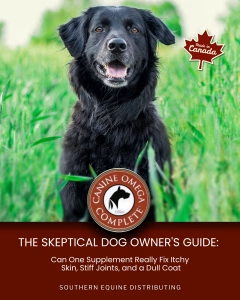Packed with essential omega-3 fatty acids, fish oil supports the overall health and well-being of horses and dogs, including cardiovascular function, joint health, skin and coat condition, and immune system strength. By incorporating fish oil into their diet, you can help ensure your companion enjoys a vibrant and active life. In this article, we will explore the importance of fish oil as a dietary supplement, its key benefits, how it works in the body, and important considerations for its use. Join us as we dive into the world of fish oil and discover why it is a valuable addition to your animal’s daily regimen.
What is fish oil?
Fish oil is a highly regarded dietary supplement derived from the tissues of oily fish. It is known for its abundant omega-3 fatty acids, which play a vital role in the day-to-day functions of a healthy equine and canine body. These essential fatty acids, namely eicosapentaenoic acid (EPA) and docosahexaenoic acid (DHA), offer a wide range of benefits that contribute to overall well-being.
Omega-3 fatty acids are classified as polyunsaturated fats and are considered “essential” because the body cannot produce them on its own. Therefore, it is crucial to obtain them through dietary sources or supplementation. Fish oil serves as an excellent source of omega-3 fatty acids, providing a convenient way to ensure adequate intake.
One of the key components of fish oil is EPA, which plays a significant role in regulating inflammation within the body. Inflammation is a natural response triggered by the immune system to protect against injury and infection. However, chronic inflammation can lead to various health issues. EPA helps promote a healthy inflammation response by reducing excessive inflammation, which can be beneficial for equines and canines experiencing inflammatory conditions, such as arthritis or allergies.
DHA, another essential omega-3 fatty acid found in fish oil, is particularly beneficial for brain function and development. It is a vital component of cell membranes, including those in the brain and retina. DHA supports cognitive function, promotes healthy brain aging, and contributes to optimal eye health. In equines, DHA may play a role in maintaining a calm and focused demeanour, making it beneficial for performance horses. In canines, DHA supports brain development in puppies and cognitive function in older dogs.
Sources of Fish Oil
Cold-Water Fish
The most common and reliable source of fish oil is cold-water fish. These include salmon, mackerel, anchovies, sardines, and trout. Cold-water fish are rich in omega-3 fatty acids, particularly EPA and DHA. They accumulate these beneficial fatty acids by consuming algae and other marine organisms that contain them. Fish oil derived from cold-water fish is considered high-quality and potent, providing optimal levels of omega-3 fatty acids for equine and canine health.
Krill
Krill oil is another source of omega-3 fatty acids that is gaining popularity in the market. Krill are small shrimp-like crustaceans found in the ocean. They also feed on algae, which makes them rich in EPA and DHA. Krill oil is known for its high bioavailability, meaning that the omega-3 fatty acids are easily absorbed and utilized by the body. It can be a suitable alternative for equines and canines with specific dietary needs or sensitivities.
Algae
Algal oil is a plant-based source of omega-3 fatty acids derived from certain types of algae. While fish obtain omega-3 fatty acids from consuming algae, algal oil provides a direct and sustainable source of EPA and DHA. It is an excellent option for equines and canines with dietary restrictions, such as those on a vegetarian or vegan diet. Algal oil offers the same benefits as fish-derived fish oil and is a suitable alternative for those looking for a non-animal source.
Benefits of Fish Oil
Fish oil offers a wide range of benefits for equines and canines due to its rich content of omega-3 fatty acids, EPA and DHA. Let’s explore some of the key advantages that these essential fatty acids provide across species:
Healthy Skin and Coat
Omega-3 fatty acids in fish oil promote healthy skin and a shiny, lustrous coat. EPA and DHA help nourish the skin from within, reducing dryness, itchiness, and flakiness. They also support the production of natural oils, improving coat texture and reducing shedding. Regular supplementation with fish oil can help maintain a healthy, vibrant appearance in horses and dogs.
Joint Health and Mobility
Particularly active horses and dogs or older individuals can experience joint discomfort and stiffness. The anti-inflammatory properties of EPA in fish oil help reduce inflammation in the joints, alleviating pain and improving mobility.
Cardiovascular Health
Cardiovascular Health: Omega-3 fatty acids are known to have cardiovascular benefits for both horses and dogs. EPA and DHA help regulate blood pressure, reduce triglyceride levels, improve overall heart function, and promote healthy circulation.
Cognitive Function and Development
DHA is essential for brain function and development. It plays a vital role in the structure and function of brain cells, supporting cognitive abilities, memory, and learning. In horses, DHA can enhance focus and concentration, while in dogs, it aids in brain development in puppies and helps maintain cognitive function in senior dogs.
Allergy and Inflammation Management
Allergies and inflammatory conditions can cause discomfort and distress in equines and canines. The anti-inflammatory properties of EPA in fish oil help modulate the immune response, reducing the intensity of allergic reactions and managing inflammation. Fish oil supplementation can relieve itching, redness, and inflammation associated with allergies and skin conditions.
Eye Health
DHA is also essential for optimal eye health. It supports the development and maintenance of the retina, helping to promote good vision. Regular supplementation with fish oil can contribute to maintaining healthy eyes and visual acuity in equines and canines.
Why Not Flaxseed?
Flaxseed is a popular supplement among horse owners because it also offers omega-3, albeit as alpha-linolenic acid (ALA). ALA is sometimes referred to as the precursor to EPA and DHA because the body must convert the ALA to EPA – a relatively inefficient process.
Key Considerations and Usage
While fish oil provides several benefits for equines and canines, it is essential to consider a few key factors and follow proper usage guidelines to ensure optimal results and safety. Here are some important considerations when incorporating fish oil into your animal’s routine:
Quality and Purity
When selecting a fish oil supplement, it is crucial to choose a high-quality product that is pure and free from contaminants. Look for fish oil supplements that undergo rigorous testing to ensure they are free from heavy metals, toxins, and pollutants. Opt for reputable brands that source their fish oil from sustainable and well-managed fisheries.
Dosage and Administration
The appropriate dosage of fish oil may vary depending on the size, age, and specific health needs of your equine or canine. It is recommended to consult with your veterinarian to determine the ideal dosage for your animal. Follow the instructions provided by the manufacturer or as advised by your veterinarian for accurate dosing and administration.
Storage and Shelf Life
Proper storage of fish oil is essential to maintain its freshness and potency. Store the fish oil supplement in a cool, dry place away from direct sunlight or heat sources. Check the expiration date and ensure that the product is within its shelf life before use.
Conclusion
Incorporating fish oil into your equine’s or canine’s diet can be valuable to their overall wellness regimen. However, it is important to approach it with careful consideration, proper dosage, and monitoring. By following these key considerations and guidelines, you can harness the benefits of fish oil to support your beloved animal companion’s health, vitality, and longevity.






